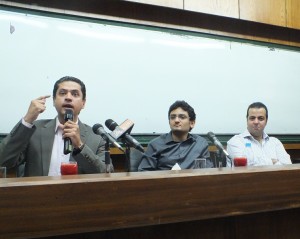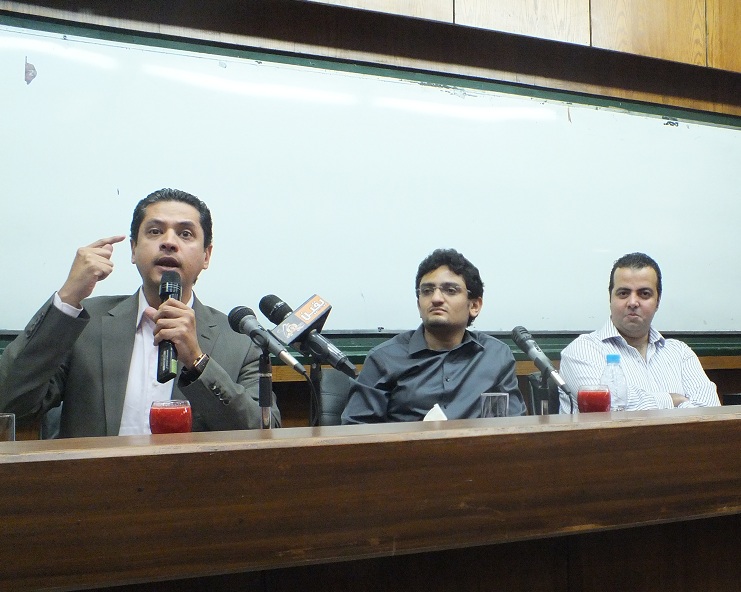
Fady Salah / DNE
Cairo University held a seminar discussing the Egyptian political situation, hosting three prominent political figures; Wael Ghoneim, Mostafa Al Naggar and Abdul Rahman Youssef.
The guests agreed on the crucial role of youth in enhancing Egypt’s political future, they also agreed on the importance of political participation and raising the level of political awareness, asserting that they are the only way to have a better political structure in Egypt.
In addition, they all expressed their optimism regarding the current situation in Egypt, asserting that lots of changes have already happened since the beginning of the 25 January Revolution, adding that more changes will happen soon with the engagement of youth and the different social and political actors.
Wael Ghoneim, a prominent figure and the admin of the “We are all Khaled Said” Facebook page, asserted in Tuesday’s seminar that one couldn’t imagine the whole sequence of events starting from the eruption of the revolution. However, he asserted that having faith and using different social media in a beneficial way has led to the revolution and the changes that accompanied it.
“People tend to forget where we were and where we have turned out to be now. Lots of changes happened although not the change we hoped for.” said Ghoneim.
“Opposition is not expressing anger, this is called objection. Opposition is presenting a different course of action other than the ruling government is using, and then mobilising the masses to support this course of action.” He added.
Moreover, he said that the Egyptians are now responsible for creating a new pole to compete with the Freedom and Justice Party. He said that corruption arises from the existence of a one-party system, where the ruling party monopolises power and doesn’t fear any other political actor. For that reason, joining political parties, raising political awareness and working in collective groups is necessary, according to Ghoneim.
On the 100-day plan and president Morsy’s speech and renaissance project Ghoneim asserted that he can’t see the borderlines or the time frame of the project. He added that there was a general state of over-promising in the different presidential programs, mentioning that they were all missing an action plan to be implemented.
“Promises like solving the traffic crisis in 100 days is like restoring security in 24 hours.” Said Ghoneim.
Ghoneim also criticised the speech of president Morsy in the anniversary of the 6 October War, explaining that it is not acceptable to mention the achievements of the 100 days in front of the stadium audience for them to cheer and applause.
“It is not logical to say that you won’t accept Egyptian’s eating out of usury, while your salary is coming out of loans and treasury bills.” Concluded Ghoneim, referring to President Morsy’s speech in Cairo stadium.
Abdul Rahman Youssef, prominent poet and political activist, also criticised Morsy’s speech. He called it Morsy’s worst speech because of the long duration, the audience who were predominantly Muslim brotherhood supporters, and finally because Morsy justified his failure in achieving the 100-day plan he promised to implement.
The poet agreed with Ghoneim on the importance of political participation. He said that the political arena should not be left for the Islamist groups to dominate. However, he said that the current political actors are divided; despite that they have enough supporters and enough financial capabilities.
Abdul Rahman concluded his speech by encouraging students to participate in political life, by joining political parties and student unions.
Mostafa Al-Naggar, the former Member of Parliament, focused on the current role of youth in the political scene, saying that youth are not empowered yet, mentioning that the constituent assembly has only three members that could be considered as youth.
Regarding the upcoming parliamentary elections, Al-Naggar expressed his fear that it might be catastrophic; saying that if the political parties couldn’t agree on strong coalitions the upcoming parliament would be dominated by the Freedom and Justice Party.
“I never considered president Morsy as a strong candidate, and yet he turned out to be the president. That is the Muslim brotherhood powerful elections mechanism.” concluded Al-Naggar.
The seminar was held at the faculty of economics and political science – Cairo University.

